- Home
- Julie Smith
Huckleberry Fiend
Huckleberry Fiend Read online
Praise for HUCKLEBERRY FIEND, the second book in Edgar-winner J.D. Smith’s Paul Mcdonald series:
“A deftly plotted mystery…a delightful book.”
—San Antonio Express News
“A literary romp…a bright, light, cleverly written tale.”
—Cincinnati Post
HUCKLEBERRY FIEND
A Paul Mcdonald Mystery
By J.D. Smith
booksBnimble Publishing
New Orleans, La.
Huckleberry Fiend
Copyright 1987 by Julie Smith
Cover by Nevada Barr
ISBN: 9781625171436
www.booksbnimble.com
All rights are reserved. No part of this book may be used or reproduced in any manner whatsoever without written permission, except in the case of brief quotations embodied in critical articles and reviews.
First booksBnimble Publishing electronic publication: June 2013
eBook editions by eBooks by Barb for booknook.biz
Contents
CHAPTER 1 • CHAPTER 2
CHAPTER 3 • CHAPTER 4
CHAPTER 5 • CHAPTER 6
CHAPTER 7 • CHAPTER 8
CHAPTER 9 • CHAPTER 10
CHAPTER 11 • CHAPTER 12
CHAPTER 13 • CHAPTER 14
CHAPTER 15 • CHAPTER 16
CHAPTER 17 • CHAPTER 18
CHAPTER 19 • CHAPTER 20
CHAPTER 21 • CHAPTER 22
Dedication
Acknowledgments
Author’s Note
Guarantee
If You Enjoyed This Book…
The Paul Macdonald Series
Also by Julie Smith
A Respectful Request
About the Author
CHAPTER 1
Why destroy her face? Such a nice face. A freckled, wholesome face that I liked enough to look at every night. (And did most nights.) She’d been shot once in the right cheek and once in the forehead, as well as twice in the chest and once in the neck, as if the killer had gone berserk.
She’d been around six months and she was already Miss Popularity— nobody didn’t like Rebecca Thaxton. But she’d opened her door to someone she must have known, someone who’d apparently followed her quietly into the living room, as if for a cup of tea, and then blown her away.
* * *
In the obvious grip of the willies, Sardis turned off the news and cracked open another beer. “It must have happened so suddenly.”
“Maybe she said the wrong thing. Like, say, ‘I’ve met someone else’.”
“Brittleness doesn’t become you, dear.”
“How about this? ‘I’m in love with your husband’.”
“Save it for your incredibly lucrative books.” She was getting sniffy.
“Please leave my personal finances out of this.”
“Rebecca wasn’t that kind of person.”
“We don’t know that.” All we really knew was that she was a TV reporter with lots of vitality and intelligence, yet also with a sweetness and freshness that kept you tuning in. That’s why Sardis didn’t want to think ill of her. But she’d snapped at me because hunger was making her mean. We’d been unpacking boxes without a break for hours, and it was getting on towards dinnertime.
Fortunately, we couldn’t have picked a better neighborhood for the ritual moving-day meal. “Let’s go get a pizza,” I said. “Oliveto, Guglielmo’s, Zachary’s, or the Buttercup?”
“What’s the difference?”
I’d been briefed by a neighbor. “Zachary’s is Chicago style, Guglielmo’s is regular, and the Buttercup has a wood-fired brick oven— it’s over the Berkeley line. But Oliveto’s supposed to be the best.”
“Oliveto it is then.”
I placed the order on my brand-new phone while Sardis went up to her place for a quick shower— we’d made the big decision to buy a house together, but not the bigger one to live together. For us, being neighbors was a big enough step. We’d bought a duplex.
We were going to have a lot less privacy than we were used to, but at least we wouldn’t have to tackle the problem of whose turn it is to do the dishes. And other messy stuff that comes up when people share a household.
The truth was, I’d sort of wanted to give it a shot, but Sardis didn’t think I could handle it. Didn’t think I could handle it! I ranted for about half an hour and then holed up to sulk for a week and she had the nerve to say she rested her case. The arrogance!
Then there was the matter of our work. I was writing my not-so-lucrative books when I could afford to, but mostly freelancing to support my habit. Sardis was painting when she could afford to, but also freelancing as a graphic designer. Emotional considerations aside, we genuinely weren’t sure we could manage all that in the same house.
Yet we could get a much better deal if we bought one together. Sardis had been saving for years and I had insurance money. I’d actually managed to buy a miniature house once— back when I was getting union wages as a reporter for the San Francisco Chronicle— but I’d lost it in a fire. Now I had enough for a similar house, but my cat was sick of tripping over me.
By pooling our money, Sardis and I could get a real, adult-sized abode instead of two dollhouses, or worse yet, a couple of chintzy condos. Especially if we bought outside of San Francisco. So once we’d hit on the duplex solution, we still had to face the trauma of uprooting ourselves from the city.
Suburbia was out— either too expensive, like Marin County, or too Middle America, like Contra Costa. That left Oakland, the jewel of the mysterious East Bay. And a bitter pill to swallow. Or so we thought. A casual drive down the main street makes you think you’ve fetched up in Anywhere, U.S.A., only with a few porn palaces. And that was about the extent either Sardis or I knew of the place. We were pleasantly surprised to find dignified old neighborhoods, suitable for aging artistes.
And of course dear old Berkeley, transformed in twenty short years from Revolution Central to a hotbed of social rest, was just blocks away, now harboring enough wood-fired brick pizza ovens for all of Sicily and half of Calabria. That is, if Italy went in for gourmet take-out, which was the current way of life in Berkeley. I’d spent four years there as an undergrad, and could hardly recognize the place any more. It was going to be fun to rediscover it.
Funny, when I thought about it, all those years in Berkeley and I’d ventured into Oakland only now and then, say, to buy a shirt at Capwell’s or catch a movie at the Grand Lake. And here I was living just over the line in the Rockridge neighborhood, oddly familiar and foreign at the same time. The familiar part was College Avenue, which ended up right at the campus; the foreign part was the tameness, the quiet domesticity of sixty-year-old two-story single-family dwellings with nicely tended gardens. It was nothing like San Francisco and nothing like the East Bay I was used to. It would probably be a great place to write if I could get used to the quiet.
It was certainly a great place for an evening stroll to the neighborhood pizza joint. On the way, we picked up a bottle of cheap and delicious California red at Eddie’s Liquors and an Arnold Schwarzenegger movie at Home Video. The future was showing a lot of promise: we’d eat, drink, rot our brains with Arnold, make love, and sleep the sleep of those exhausted in a good cause. In our very own house that we didn’t even have to live together in.
“Oh, no. Not pizza!” The voice came from our brand-new porch, where no one had a right to be passing judgment on our dinner choice. Where, in fact, no one had a right to be. Sure enough, it was a burglar.
I’d met Booker Kessler on a story, back when I worked for the Chronicle— a yarn about how a kid from the right side of the tracks got into burglary. Booker was in analysis to get the big picture, but he was pret
ty sure it had something to do with the fact that his mother had left his dad for another woman when he was in junior high. We had a few things in common, Booker and I— he’d also been an English-lit major at Cal and was one of the few people who’d indulge me in pedantic conversations about books. But I hadn’t found that out until we’d known each other a while. We’d become friends, I think, because I was frankly fascinated by his career choice and he was flattered by that. Also because I was one of the few people with whom he could be himself. He told most people he was in real estate, so naturally they thought he dealt dope.
“Why stand on ceremony?” I said. “Why didn’t you just pick the lock?”
“I wouldn’t do that.” He looked hurt. “I brought housewarming gifts.”
“In that case, come in for some wine— since pizza isn’t good enough for you.”
“It’s not that. I just wouldn’t want to get pizza gunk on what I brought.”
“The presents?”
“Something else. I’ll show you after we eat.” We agreed, but only because we were starved. Booker’s whole body was in perpetual motion. He kind of swayed his shoulders and tapped his foot and bobbed his head, as if he were coked to the gills. He was excited about something and I didn’t think it was our new digs.
He went to his car for the gifts while Sardis and I set up. I brought out my interim Cost Plus plates, and set my round oak table— the one nice piece of furniture I’d bought since the fire. Sardis dripped wax onto a saucer to serve as a candleholder.
“You may want to reconsider that,” said the returning Booker. He spoke to Sardis, but handed me a package. In it were a pair of antique pewter candlesticks, perfect for my table and a most curiously sensitive gift for a burglar to give a member of the Private Eye Writers of America. He had an eye, that Booker, no doubt the result of all the nice homes he saw in his work. “For romantic dinners with Sardis,” he said. “And by the way, I actually bought them.”
Sardis leaned over to kiss him for the sentiment, but he waved her away. “After dinner. When I give you yours.” We went through the pizza like the Cleveland Wrecking Company. After a couple of glasses of wine, the moving aches were beginning to leave my back and legs. If I’d resented Booker’s intrusion on the evening, I didn’t any more. Pretty much anything was okay with me now.
Booker said, “Time for show and tell. Let’s clean up and put the wine away.”
He’d hit on just about the only two things that weren’t okay. “Give me a break.”
“Okay, okay. We don’t have to clean up. Let’s just leave our glasses here and go in the living room a minute.”
“What on earth is so precious we can’t even have wine in the same room with it?”
“Trust me.”
He took two ordinary shoeboxes out of a paper bag and opened the top box with such ceremony I half expected a toy snake to pop out, or maybe a live frog. But there was nothing the least bit unruly in the box. Just a pile of what appeared to be old letters. The paper was half-sheet size, covered with a clear, expansive handwriting, a handsome script that emphasized roundnesses and fullnesses. Leaning over my shoulder, Sardis read the first couple of lines, “You don’t know me, without you have read a book by the name of ‘The Adventures of Tom Sawyer,’ but that ain’t no matter. The book was made by Mr. Mark Twain, and he told the truth, mainly…”
I got instant goose bumps. It began to occur to me that the pages were far too uniform and there were far too many to be letters; also that I saw no salutation. And finally, that the first two lines of Huckleberry Finn were a damned funny thing to put in a letter. In fact, there seemed only one appropriate place for them. And Booker was a rabid Mark Twain fan who was also a burglar. I was suddenly horrified at what he might have done. “What the bloody hell is this?” I blurted in a tone that accused, tried, and convicted.
“Hold on,” he said. “I didn’t steal it. That is, I did, but only sort of accidentally. I don’t know what it is, dammit! What does it look like to you?”
I spoke cautiously: “Like an old handwritten copy of Huckleberry Finn.”
“It’s not the whole thing— less than half, in fact. But what makes you think it’s a copy?”
“It couldn’t be the real thing. Could it?” The words came out sounding scratchy. Could I possibly have Mark Twain’s original manuscript in my house?
“I wish I knew.” He sounded defeated. “I was up staring at it half the night— just the first page— I didn’t dare paw the thing.” He spoke with reverence, then rue: “Much as I wanted to. Finally I remembered about you.”
I hadn’t a clue what he meant by that, but first things first. “Where did you get this thing?”
“You know I’m in analysis.”
We nodded.
“I’m trying, you know, but there’s still a few dumb childish things I can’t seem to quit doing.”
When neither of us mentioned the obvious, he kept talking: “After Mom left, Dad spent a few years in mourning, and then he lived with a nice woman for a while, when I was in college. But lately, he’s been chasing young stuff. He goes out with all these women my age. Younger even, sometimes. How do you think that makes me feel?”
“I should think you’d be happy for him.”
“Some people might. But you’ve gotta remember, I’m fucked up.”
Sardis gave it a go: “It must make you feel left out. And sad probably.”
I had a better idea: “And kind of like burgling, I’ll bet.” He looked sheepish. “He’s been dating this Japanese stew named…”
“Sukiyaki?”
“…this Nisei flight attendant— Isami Nakamura. Nice girl about twenty-three; two years of college, probably; no intellectual pretensions. But nice, like I said.” He shrugged. “I don’t know; something came over me. I hit her last night.”
“You mean you broke into her house— and found this?”
“Yes. But I don’t think it’s hers. It was in her roommate’s closet— another stew named Beverly Alexander.”
Sardis said, “Flying’s a good job for smuggling. What’s the airline?”
“Trans-America. A new no-frills one that only flies to New York.”
“Oh.”
I just couldn’t take it in. The original Huck Finn in a flight attendant’s closet? I said: “It must be a fake. Or maybe just a copy.”
“Who’d copy it? It can’t be that. Now, it could be a forgery… but I’ll tell you something. That thing gives me goose bumps.”
I knew what he meant.
“Suppose it is the real thing— then what was Beverly Alexander doing with it? I’ll tell you what— almost certainly something criminal. Maybe she stole it from some collector— somebody it really meant a lot to. Or listen, maybe it belongs to a university. Maybe even Cal. They’ve got a huge Mark Twain collection.”
“But if something this important had been stolen, wouldn’t it be news?”
“Maybe not. If you stole it, maybe what you’d do is, you’d hold it for ransom. The insurance company would quietly pay off— some sum less than it would cost them if the manuscript were lost— and the police would never come into it.”
“Wait a minute, Booker— are you thinking of collecting some ransom money yourself? Or maybe just making a simple sale?”
“I can’t believe you said that.”
“Said what?”
“I just can’t believe you don’t know me well enough to think a thing like that. In the first place, if I had any original Mark Twain manuscript— not even Huck Finn, which must be worth hundreds of thousands— I would never sell it. Never, never, never. I’d keep it and cherish it, and love it…”
“And honor and obey it.”
“Oh, can it, Mcdonald— you know how much I love my paintings? I’d trade all of them for that. If it’s real.” Booker had a spectacular art collection— probably not worth hundreds of thousands, but he did dote on it. “The thing is, it’s not right, don’t you understand? Just because I’m a
burglar, do you think I don’t have any morals? If that’s a genuine Mark Twain manuscript, I personally feel it should be in a university library, where everyone can see it. But if it belongs to a private collector, I figure it’s someone who knows how to appreciate it. And I want it returned.”
“You want it returned.” I’d been a bit slow on the uptake, but there’s no predicting the twists and turns in people’s private codes of ethics. I, for one, could never understand why Sam Spade felt he had to avenge the partner whose wife he was happily boffing. Booker’s position made a damned sight more sense than that; I just hadn’t seen it coming.
“I do,” said Booker. “And I’ll pay you to do it for me.”
“Why not do it yourself?”
“I’d rather not be associated with it— due to my eccentric line of work.”
“What if it’s authentic, and Beverly’s the rightful owner?”
He shrugged. “Then give it back. For all I know, she’s a Mark Twain scholar who saved up for it by high-altitude hash-slinging. I wouldn’t deprive her.”
“But why me?”
“You know why you. You’re an investigative reporter— of sorts, when you get off your ass. And you’ve got the time. And you need the money.”
“How much?”
“What do you charge for freelancing?”
“Forty-five dollars an hour.”
“I’ll make it fifty-five, with a five-hundred-dollar minimum. I mean, say the thing turns out to be worthless, and you find out in half an hour, and then mail it to Bev. You’ll still get the five hundred. But if you need a month to work on it, take it.”
“Done.”
Sardis said, “Okay. Now where’s my present?”
“Already installed,” said Booker. “But don’t worry, I didn’t force the lock.” He held up a fistful of keys and picks.
CHAPTER 2
If Booker ever quit burgling, he had a great career as a decorator. Sardis’s gift was a small tree (ficus benjamina, according to the proud owner) and it made all the difference in her living room.
Having climbed the stairs to see it, we had no strength left for the Schwarzenegger movie, and barely enough to make it to the bedroom, where we collapsed in a pitiful heap. I dreamed blissfully of life on the Mississippi, and found you feel mighty free and easy and comfortable on a raft. I was smoking my corncob pipe, trailing toes in the water and feeling all warm from the sun when the idyll turned into a horrible nightmare. A hideous harpy suddenly swooped from the sky and tore the very pipe from my mouth. Soaring again, she opened her talons flat-out, showing each gleaming claw in the light and dropping the pipe in a gesture of utmost contempt. Then she dive-bombed, beating me with her wings, soaring again to reconnoiter. She laughed the laugh of the Wicked Witch of the West and shrieked in the voice of Margaret Hamilton: “I’ll civilize you, young man!” And I knowed, as Huck would say, who she was; not to mention who she warn’t: not the witch and not the Widow Douglas and not Aunt Sally nor Aunt Polly nor Miss Watson. She was Sardis.

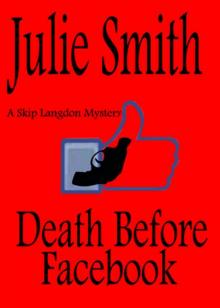 Death Before Facebook (Skip Langdon #4) (Skip Langdon Mystery) (The Skip Langdon Series)
Death Before Facebook (Skip Langdon #4) (Skip Langdon Mystery) (The Skip Langdon Series) P.I. On A Hot Tin Roof
P.I. On A Hot Tin Roof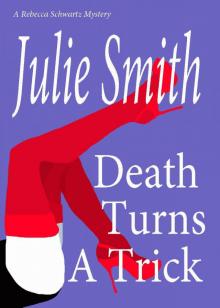 Death Turns A Trick (Rebecca Schwartz #1) (A Rebecca Schwartz Mystery) (The Rebecca Schwartz Series)
Death Turns A Trick (Rebecca Schwartz #1) (A Rebecca Schwartz Mystery) (The Rebecca Schwartz Series) The Axeman's Jazz (Skip Langdon Mystery Series #2) (The Skip Langdon Series)
The Axeman's Jazz (Skip Langdon Mystery Series #2) (The Skip Langdon Series) The Kindness of Strangers (Skip Langdon Mystery #6) (The Skip Langdon Series)
The Kindness of Strangers (Skip Langdon Mystery #6) (The Skip Langdon Series)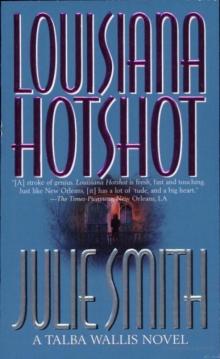 Louisiana Hotshot
Louisiana Hotshot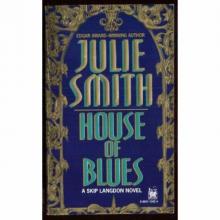 House of Blues
House of Blues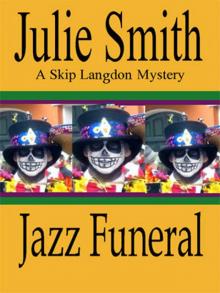 Jazz Funeral (Skip Langdon #3) (Skip Langdon Mystery) (The Skip Langdon Series)
Jazz Funeral (Skip Langdon #3) (Skip Langdon Mystery) (The Skip Langdon Series) Tourist Trap (Rebecca Schwartz #3) (A Rebecca Schwartz Mystery) (The Rebecca Schwartz Series)
Tourist Trap (Rebecca Schwartz #3) (A Rebecca Schwartz Mystery) (The Rebecca Schwartz Series)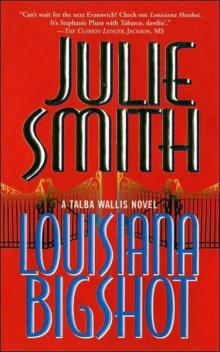 Louisiana Bigshot
Louisiana Bigshot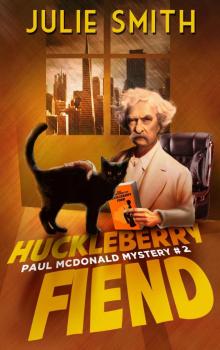 Huckleberry Fiend
Huckleberry Fiend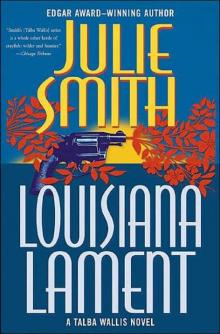 Louisiana Lament
Louisiana Lament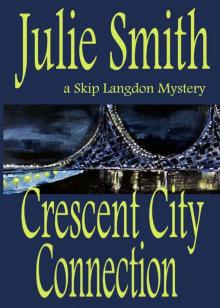 Crescent City Connection (Skip Langdon Mystery #7) (The Skip Langdon Series)
Crescent City Connection (Skip Langdon Mystery #7) (The Skip Langdon Series)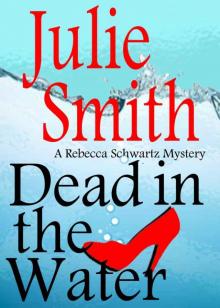 Dead In The Water (Rebecca Schwartz Mystery #4) (The Rebecca Schwartz Series)
Dead In The Water (Rebecca Schwartz Mystery #4) (The Rebecca Schwartz Series)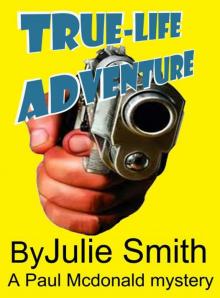 True-Life Adventure
True-Life Adventure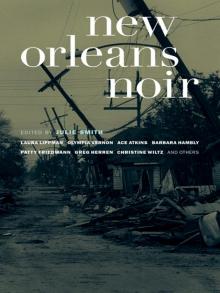 New Orleans Noir
New Orleans Noir